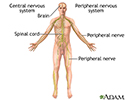Neurologic deficit
A neurologic deficit refers to abnormal neurologic function of a body area. This altered function is due to injury of the brain, spinal cord, muscles, or nerves that feed the affected area.
Examples include:
- Abnormal reflexes
- Inability to speak
- Decreased sensation
- Loss of balance
- Mental function problems, such as memory loss or difficulty with thought processing
- Vision changes
- Walking problems
- Weakness of the face, arms or legs
References
Deluca GC, Griggs RC. Approach to the patient with neurologic disease. In: Goldman L, Schafer AI, eds. Goldman-Cecil Medicine. 26th ed. Philadelphia, PA: Elsevier; 2020:chap 368.
Klatt EC. The central nervous system. In: Klatt EC, ed. Robbins and Cotran Atlas of Pathology. 4th ed. Philadelphia, PA: Elsevier; 2021:chap 19.
Review Date: 1/23/2023
Reviewed By: Joseph V. Campellone, MD, Department of Neurology, Cooper Medical School of Rowan University, Camden, NJ. Review provided by VeriMed Healthcare Network. Also reviewed by David C. Dugdale, MD, Medical Director, Brenda Conaway, Editorial Director, and the A.D.A.M. Editorial team.



